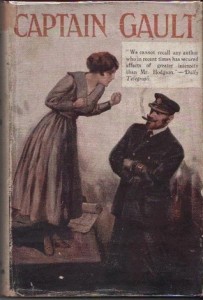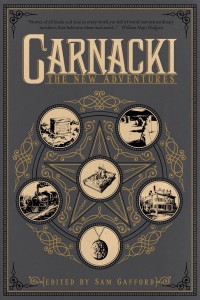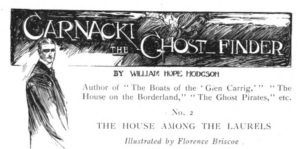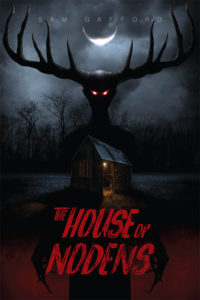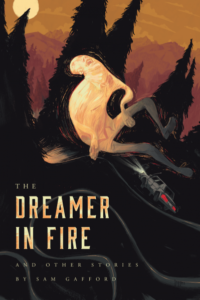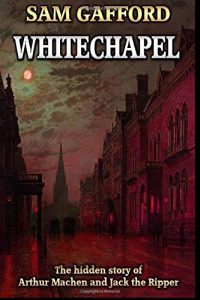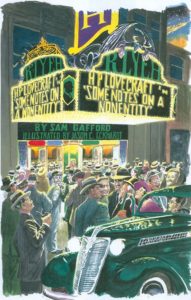Interested in the origins of weird fiction? Want to get the real lowdown on William Hope Hodgson? Then join us as we talk to author, editor and scholar Sam Gafford, in an interview which is already being described as sharper than a spinning diskos. The Night Land, Carnacki, WHH’s life, influences, and women – all come under scrutiny. Our Hope Hodgson centenary articles continue today with…
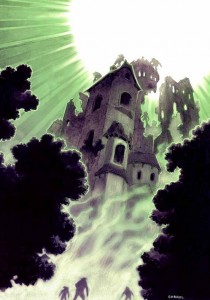
SAM GAFFORD ON WILLIAM HOPE HODGSON
greydog: Hi, Sam. It’s an odd celebration, because we feel a mixture of sadness – after all, Hope Hodgson was twenty years younger than greydog when he was killed – and wonder, in that we are still discussing him and his work. You’re one of the foremost WHH scholars around, so we’ll risk a very broad starter question. Basically, why are we still talking about him? What was so different about his work that he stands out even now?
Sam: I’d venture to say that Hodgson is more popular today than he has ever been. His works are constantly being reprinted, much of his fiction is available free online and scholarly interest is at an all-time high. I think that a lot of the reason for this popularity is due to the vivid imagination evident in his writing. Some may come to Hodgson out of historical interest now that he is considered an early pioneer of science fiction and horror but stay because of his stories.
Another thing that might be helping is the fact that, except for THE NIGHT LAND, most of his fiction is written in a vibrant style that is more modern than some of his contemporaries like Wells, Blackwood or Lovecraft. His short stories, in particular, are very powerful and sparsely written similar, in some ways, to a Hemingway. “A Tropical Horror” is a classic example of this as the action begins practically immediately as a giant sea monster attacks a lone ship and its crew. Hodgson gets great acclaim for his novels and deservedly so, but I feel that it’s in many of his short stories that his talent as a writer really shines.
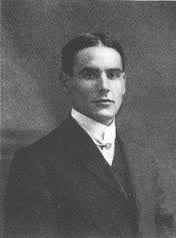
greydog: Hope Hodgson died late in the Great War , of course, as a result of a mortar bombardment. Given the number of war poets and correspondents, is he himself known to have written anything during his military service years?
sam: Hodgson wrote a couple of ‘articles’ regarding some WWI topics such as “How the French Fought the War” and these were widely circulated during his time. He joined up in the opening months of the war in 1914 but was then wounded in 1916 while he was training others in the movement and handling of big guns at Salisbury Plain. He was sent home and spent about a year recovering during which time I believe he wrote those ‘articles’ as well as several other items. Carnacki had been finished years before but the Captain Gault stories show a definite influence of WWI with the abundance of German spies and what was then more modern ships and weapons. There is, of course, always the possibility that he might have been working on more projects that were left unfinished due to his tragic death but we will likely never know about this.
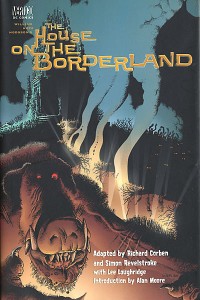
greydog: Sadly not. Letters to, from or about WHH are scarce; occasional ‘lost’ poems have surfaced over the years. We can be pretty sure that no major works have been lost, but speculate for us. Is there much more, in a tangible form, that is likely to be found now, either of his writings or in biographical terms?
sam: As we’ve discussed many times, the lack of primary sources is our greatest hurdle to developing a more rounded idea of Hodgson the man and the writer. We’ve very few letters to consult. I believe that there may be groups of letters that are being held in private collections but, until the owners (or descendants) make them public, we’ll never know.
When faced with such ‘dead-ends’ in research, we have to then look to other sources such as third party memoirs or letters. Sadly, few of these have come to light but I remain hopeful that somewhere there may be a batch of letters or a memoir written by someone who knew Hodgson and mention him in their works. That’s why it’s so important for as many people as possible to be alert and vigilant in finding such obscure references. I still hope that there may be some things yet to come. I feel confident, however, in stating that there are no major lost works of Hodgson’s floating around out there. Any stories that might come to light now are likely to be minor.
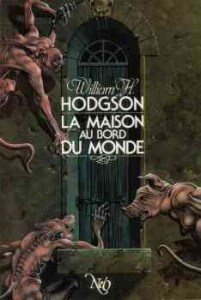
greydog: The Night Land and House on the Borderland have few if any parallels in the period when he was writing, and few obvious antecedents. His family were not literary, not did he seem to move socially in such circles. Are there any clear influences on him in these weirder works?
sam: Again, our lack of primary sources stymies us here. Outside of a few reviews that Hodgson wrote of other people’s work, we really have no clue as to what his influences were or what impelled him to write in the first place. Hodgson’s parents were both educated and literate people so it is likely that they encouraged this trait in their children. In his biographical essays about Hodgson, R. Alain Everts states that Hodgson’s siblings remembered him as always reading.
Hodgson was intelligent and had a curious mind which is evident in his writing. His first published items were articles about ‘physical culture’ which appeared in SANDOW’S MAGAZINE which was the equivalent of a modern ‘bodybuilding’ magazine today. Again, Everts essays have Hodgson’s siblings recounting how he loved to regale them with stories which, no doubt, became even more fantastic when he came home during his off months at sea.
When I was asked at a convention, “What do you think inspired Hodgson to write?” My answer was “Poverty.” Although a bit flippant, there is much truth in this. When Hodgson returned from the sea and after the failure of his ‘School of Physical Culture’, he was the primary means of support for his mother and sister. He had to make money and, after enjoying some success with his exercise articles, must have concluded that this was a quick and enjoyable way to pay the bills. I think that he was also very eager to be accepted by the ‘writing’ world but never quite got there despite his books often getting very eager reviews.
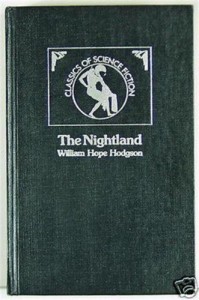
greydog: How do you feel about attempts to make The Night Land, a long novel which does have its problems of style and language in places, more ‘accessible’?
sam: Although I understand the desire to make THE NIGHT LAND a bit less intimidating to new readers, I don’t particular agree with doing this. As difficult as the style Hodgson choose for this book is, and it is undeniably difficult, by editing or, even worse, rewriting the story, I think we do Hodgson a disservice. I have always championed the concept that the author’s vision, good or bad, should be respected and preserved which is why I also disapprove of Lin Carter’s ‘editing’ of the novel when it was reprinted as part of the Ballantine Adult Fantasy Series. Who are we to say that we know better what the story needs than the author? The book, short story or any written work should stand, of fall, on its own merits.
The only time I would agree with changing the text is when it is adapted for a different medium like radio, television, movies or graphic novels. Certainly, anyone doing a graphic novel interpretation of THE NIGHT LAND should not be required to put everything from the novel into their vision. Otherwise, leave it alone and enjoy it the way that Hodgson meant it to be enjoyed.
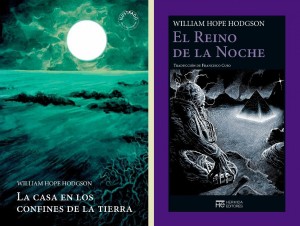
greydog: We’re sometimes struck by the male physicality of much his work – men DOING, or failing to do. Is anything known of his views on women?
sam: Ironically, I’ve written on this topic before in my article “Hodgson and Women”. It’s a very interesting thing to consider. Once again, the lack of primary sources means we don’t know how Hodgson felt about women so we have to infer things from his writings.
We know that Hodgson’s life was primarily dominated by women. He left home at 13 and, during his time at sea, his father dies. He returns home to live with his mother and sister and takes the role as family provider and, in keeping with the societal norms of the day, likely the family protector as well.
He does not marry until 1913 when he is 35 years old which is, in and of itself, odd for the people at that time. There are rumours of an earlier romance which ended poorly but we have no details on this.
If we look over the progression of Hodgson’s writing from the novels and short stories through to the Captain Gault stories, we see a change in attitude towards women. In the early stories, women are something to be loved and, above all else, protected from the harsh realities of the world. We see this ‘damsel in distress’ theme often in his early work which was also a popular trope at the time.
But, by the time we reach some of the Captain Gault stories, this opinion towards women changes. No longer are women thought of as objects of romantic love and adoration but instead as crafty, insidious creatures that are, above all else, untrustworthy. Gault outsmarts several women because he simply cannot bring himself to believe or trust a woman.
It is a remarkable change and one that we can only speculate upon. Did his ruined love affair create a distrust towards all women which resulted in him remaining unmarried for so long? Or did something occur during his marriage that also changed his views? We will never know for sure.
greydog: As we’ve said on greydogtales before, Carnacki the Ghostfinder is probably second only to Sherlock Holmes in the number of pastiches and re-imaginings of a single-author detective from that period. How do you feel about the original Carnacki stories, which H P Lovecraft thought were Hope Hodgson’s weakest pieces (though HPL had not read the longest tale, ‘The Hog’)?
sam: I have never understood Lovecraft’s dislike of the Carnacki stories. As a youthful admirer of Holmes, you would think that Lovecraft would be delighted with this character that approaches supernatural mysteries in a logical, scientific manner. Instead, Lovecraft (much as other writers including Ellery Queen) berates Hodgson for trying to create such an unnatural blending of genres.
For myself, I find Carnacki to be Hodgson’s greatest creation and his enduring popularity shows that I am not alone. To me, they are great stories that masterfully combine mystery and horror (as did some of Poe’s finest stories) and endlessly enjoyable to read. It is amazing to consider that Carnacki has become so popular when Hodgson himself only wrote 9 stories with the character and, of those, only 6 were printed in his lifetime. A true testament to the brilliance of the concept!
greydog: Absolutely – a landmark in the development of the occult detective as a concept. Presumably, since you’ve published two volumes of Carnacki stories by contemporary authors, you still get some satisfaction from good pastiches and re-workings of the Ghost Finder? Are there approaches to the canonical material for which you don’t particularly care?
sam: I haven’t ever come across anything that I positively hated although there have been some that I just think didn’t work. Some writers, like William Meikle, understand the Carnacki concept implicitly and write at such a level that they could easily compete with Hodgson’s own stories. Much like Lovecraft’s Mythos stories, I think it’s a wonderful sandbox to play in and I would hope that Hodgson would agree. I think that perhaps the one rendition I cared the least for was Alan Moore’s interpretation of Carnacki in his LEAGUE OF EXTRAORDINARY GENTLEMAN graphic novel series. Carnacki is portrayed as a bit of neurotic mess rather than the strong, albeit often frightened character he needs to be.
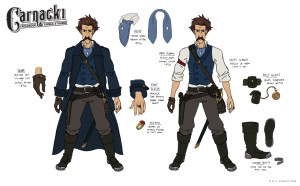
greydog: We are hugely fond of the Ghost Finder ourselves, as is obvious. Now, if someone said they had never read any WHH, where would you suggest they start?
sam: It may come as some surprise but I’d probably not suggest starting with the novels. I think that reading the short stories like “A Voice in the Night”, “A Tropical Horror” and the Sargasso Sea stories give a much stronger impression of his writing. If pressed to recommend a novel, I’d likely pick THE HOUSE ON THE BORDERLAND as it is a work that is completely without equal anywhere. Definitely leave THE NIGHT LAND for last. If someone were to try that novel first, they would likely come away from it with a bad impression of Hodgson’s writing despite the imaginative power it displays.
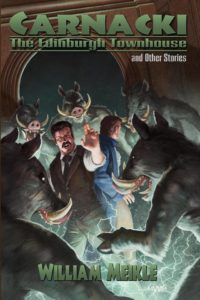
greydog: On a personal note, we did ask you ages ago if you felt Hope Hodgson’s work had influenced your own work, but you’ve been writing and been published quite a bit since then. Is he still more of a background mist than an imminent fog-bank when you write?
sam: I’ve yet to write a ‘Hodgsonian’ story in the same way that I’ve written many Lovecraftian type tales. Or, at least, a story that on the surface would be something I could point to and say, “That’s Hodgson right there”. Rather, I take away from Hodgson the same thing I take from Lovecraft which is feeling of ‘cosmic horror’ that is so prevalent in both writer’s works. That concept that there is something out there that is so horrible and so amazingly indifferent to humanity is, at its heart, the foundation of all of my own writing and I do feel that I got a great bit of that concept from Hodgson.
greydog: Much the reason why we often refer to Hope Hodgson as at least the ‘uncle’ of weird fiction. So, finally, no plans to follow up on your H P Lovecraft graphic book ‘Some Notes on a Non-Entity’ with a Hope Hodgson version?
sam: That is unlikely for two reasons:
- We don’t have enough biographical information to do a comprehensive graphic novel and,
- My collaborator, Jason Eckhardt, would likely kill me if I even suggested this with the amount of research and drawing detail that would be involved.
greydog: Both very fair points. Sam, many thanks for joining us.
sam: Thanks for having me!
APART FROM his critical work on Hope Hodgson, Sam Gafford has had four recent publications (of his own writing) which should be of interest – a novel, a whole collection of his short stories, an excellent and strange period novel concerning Arthur Machen and the Whitechapel Murders, and a graphic book on H P Lovecraft’s life. You can see them below, with links.
We’ll be back in two or three days with something entirely different – as usual….
